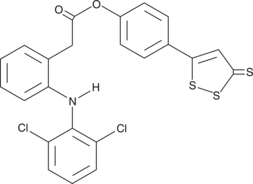Territorial Availability: Available through Bertin Technologies only in France
- Synonyms
- 2-[(2,6-dichlorophenyl)amino]-benzeneacetic acid, 4-(3-thioxo-3H-1,2-dithiol-5-yl)phenyl ester
- Correlated keywords
- inflammation H2S NSAIDs indomethacin gastric damage leukocytes hydrogen sulfides gasotransmitter vasodilator atb337 ACS-15 ACS15 ACS S SDiclofenac Diclofenac
- Product Overview:
Hydrogen sulfide (H2S) is a naturally occurring gasotransmitter with vasodilator and inflammatory modulating activity.{15636,15971} Non-steroidal anti-inflammatory drugs (NSAIDs), such as indomethacin, diclofenac, and ibuprofen, are some of the most commonly used anti-inflammatory drugs available but exhibit significant side effects, particularly gastric damage, when used chronically. ATB-337 is a hybrid molecule of an H2S donor and the NSAID diclofenac.{16442} In rats, diclofenac at 10-50 µmol/kg caused significant gastrointestinal damage, whereas no damage was observed with ATB-337 treatment at the same dose. ATB-337 at 50 µmol/kg does not promote leukocyte adherence to vascular endothelium, an effect observed with diclofenac treatment alone. COX-1 and COX-2 were inhibited with similar efficacy by diclofenac and ABT-337. An increase in expression of the pro-inflammatory mediator TNF-?, as well as, the adhesion molecules ICAM-1 and LFA-1 were not observed in rats treated with 50 µmol/kg ABT-337, effects seen with equimolar doses of diclofenac. These results indicate that H2S-releasing derivatives of NSAIDs may prove to be more effective anti-inflammatory agents than traditional NSAIDs alone.
Cayman Chemical’s mission is to help make research possible by supplying scientists worldwide with the basic research tools necessary for advancing human and animal health. Our utmost commitment to healthcare researchers is to offer the highest quality products with an affordable pricing policy.
Our scientists are experts in the synthesis, purification, and characterization of biochemicals ranging from small drug-like heterocycles to complex biolipids, fatty acids, and many others. We are also highly skilled in all aspects of assay and antibody development, protein expression, crystallization, and structure determination.
Over the past thirty years, Cayman developed a deep knowledge base in lipid biochemistry, including research involving the arachidonic acid cascade, inositol phosphates, and cannabinoids. This knowledge enabled the production of reagents of exceptional quality for cancer, oxidative injury, epigenetics, neuroscience, inflammation, metabolism, and many additional lines of research.
Our organic and analytical chemists specialize in the rapid development of manufacturing processes and analytical methods to carry out clinical and commercial GMP-API production. Pre-clinical drug discovery efforts are currently underway in the areas of bone restoration and repair, muscular dystrophy, oncology, and inflammation. A separate group of Ph.D.-level scientists are dedicated to offering Hit-to-Lead Discovery and Profiling Services for epigenetic targets. Our knowledgeable chemists can be contracted to perform complete sample analysis for analytes measured by the majority of our assays. We also offer a wide range of analytical services using LC-MS/MS, HPLC, GC, and many other techniques.
Accreditations
ISO/IEC 17025:2005
ISO Guide 34:2009
Cayman is a leader in the field of emerging drugs of abuse, providing high-purity Schedule I-V Controlled Substances to federally-licensed laboratories and qualified academic research institutions for forensic analyses. We are certified by ACLASS Accreditation Services with dual accreditation to ISO/IEC 17025:2005 and ISO Guide 34:2009.





